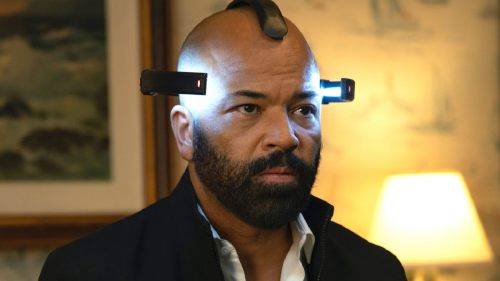OPEN THREAD: Let’s Discuss WATCHMEN’s “This Extraordinary Being”
I had my doubts about Damon Lindelof's Watchmen. As a devotee of Alan Moore and Dave Gibbons' original work, I was hesitant to believe that what made the comic so compelling could be recreated for TV. (Previous attempts at adaptions and spin-offs didn't inspire much confidence, either.) But the more I saw of the show, the more I respected its cast additions and fresh thematic spins. Episode 3's introduction of a more Comedian-like Laurie Blake did a lot to win me over. Last week's "Little Fear of Lightning" allayed my doubts entirely by giving us an intimate window into the complex trauma behind Tim Blake Nelson's Looking Glass.
Episode 6, "This Extraordinary Being", continues Watchmen's excellency streak in a big way. In it, we follow Angela Abar as she mentally maneuvers through the Nostalgia overdose that resulted from taking her grandfather's drug in the last episode. With this framing device in play, we finally get to learn just who Louis Gossett Jr.'s Will Reeves really was. Episode 6 deviates from the previous episodes by focusing exclusively on this one storyline, so apologies if you were expecting updates on Ozymandias and Looking Glass, but the extra time devoted to Reeves' biography is well-earned. In many ways, it represents not only the themes of this series, but even Watchmen as a concept.
Let's not beat around the bush (seriously, this is your last spoiler warning): "This Extraordinary Being" is the story of Watchmen's very first masked hero. The episode opens with another clip from the fictional drama American Hero Story: Minutemen where two officers are pressuring Hooded Justice to give up his identity. He does, taking off his mask to reveal the handsome (and white) features of Cheyenne Jackson, before pummeling both officers into submission and destroying the evidence.
This opener serves to remind us just how little the Watchmen world knows about the founding father of masked vigilantism. Throughout the series (and the comic), we've been treated with secondhand accounts of Hooded Justice. Hollis Mason believed that he was Rolf Müller, the East German strongman, but there wasn't enough evidence to be conclusive. Last episode, we heard Panda assert that Hooded Justice was really a time-travelling Dr. Manhattan, which I have to assume is this universe's version of the Kurt Cobain-Rivers Cuomo myth.
"This Extraordinary Being" gives us a definitive answer to the 30-year-old mystery (if you're ignoring the Before Watchmen comics, like I do) by showing that Will Reeves was the real Hooded Justice. This is a retcon that I love for several reasons, not the least of which being the added significance to Hooded Justice's iconography. The noose on his costume had me raising my eyebrows ever since I read the comic as a young teen, and to see the show confirm its connection to the wave of Black lynchings during the early 20th century gave me a hell of a rush.
But revealing the truth of Hooded Justice primarily serves to add dimension to this story's most elusive figure thus far (excepting a certain lubed-up sewer slider). In some ways, it can be argued that Will Reeves is the most important new character in the show, much in the same way that The Comedian influenced every page of the original comic despite being dead before the story even begins. With Reeves, we get echoes of our world's first comic book superhero (and Action Comics #1 even gets an explicit shout out in this ep): Superman. An orphan who survived a seemingly cataclysmic tragedy (here the Tulsa massacre instead of the destruction of Krypton), Reeves dons a badge, and later a hood and cape, to fight for truth and justice.
It's "the American way" where Reeves rubs up against some issues, because the America that he's come up in is steeped in Jim Crow segregation and racist genocide. This is where the character's other big influence besides Superman really shows: Robert Morales' acclaimed Truth: Red, White & Black which reframes the Captain America origin through a Black soldier's point of view. As the core injustice of America, racism gave birth to Isaiah Bradley's Captain America, and it similarly takes precedence in Hooded Justice's origins.
When Reeves discovers Cyclops, the white supremacist plot that has infiltrated the New York Police Department, it not only serves as his impetus for becoming Hooded Justice, but it also becomes his life's work. His investigation of the KKK offshoot discovers that they're in possession of mind control technology ("mesmerism") capable of making an entire theater of people brutalize each other. It's sort of convenient that Watchmen introduces a projector-based version of the evil plot from Kingsman and then uses it to explain how Reeves murdered Crawford in the pilot, but I'm willing to bet we haven't gotten the full story of mesmerism just yet.
Angela Abar's Nostalgia-fueled trip through the life of her grandfather is enlightening, but it isn't full of straightforward, easy answers. Reeves' thwarting of Cyclops's nefarious plot is an act of unsung heroism, no doubt about it, but his motivations and methods are somewhat murky. Was Hooded Justice a person who acted out of a selfless compulsion to protect others, or was he just an "angry man," desperate for any chance to return the violence that has been dealt to him by racist whites his entire life? "This Extraordinary Being" seems to suggest both, and the implications this holds for Reeves' actions in the present day are gripping.
Similarly unclear is what we're supposed to make of Reeves' extramarital affair with Nelson Gardner, aka Captain Metropolis. It's endlessly valuable that Watchmen is serving us a complex, Black LGBTQ superhero like this, but I couldn't help but feel heartbroken the moment Gardner's smooth-talking Minutemen founder was introduced. For Reeves, Captain Metropolis could have represented the ideal of masked crimefighting, but he ended up representing all its faults: the duplicity, the inability to be present for his family, and masked crimefighting's impotence against American structural injustices like racism and homophobia.
Nelson Gardner died before the events of the Watchmen comic (and a new entry in the Peteypedia reconfirms this), so I doubt we'll see Captain Metropolis return to this story. But it's clear that his betrayal had a profound effect on Reeves, and may even be the source of his current cynicism about masked crimefighting. I really can’t wait to see more of Will Reeves in the coming weeks—he’s quickly shot up to being the most interesting character in the show for me, and that’s saying something after last week.
Similarly important will be seeing how Angela changes after this experience. If Looking Glass can be said to be the show’s counterpart to Rorschach, then Sister Night can be likened to the comic’s Laurie (with Rorschach’s violent tendencies and determination thrown in for good measure). Angela is the show’s emotional center, and the one who is learning the most about herself and her lineage over the course of story, like Laurie’s revelation about her parents. For most of her life, Laurie was in denial about the Comedian being her biological father, and Angela has been in a similar state of denial about Crawford’s racism and her grandfather’s involvement in Crawford’s murder. Now that she’s seen the murder with her own eyes, she’s going to have to pick an allegiance that may divide the world she knows, and if Lady Trieu has her way, give birth to an entirely new one.
This episode ends on the note of Lady Trieu welcoming Angela back to consciousness in a way-too-comfy medical room. Trieu remains the last truly opaque member of the cast, and I’m excited to learn what makes her tick in the last three episodes, assuming that’s Lindelof’s plan. The original Watchmen famously alternated between issues that moved the central mystery and issues that honed in on a certain character and elaborated on them. I’ve always liked the character-focused issues more, and I’m glad that the show is recreating that feeling with episodes like these.
So what did the rest of you think? Was the singular focus on Will Reeves’ backstory a welcome change of pace for you? Was the Hooded Justice retcon justified or not? What’s the deal with Lady Trieu? This is a discussion post, so discuss!



